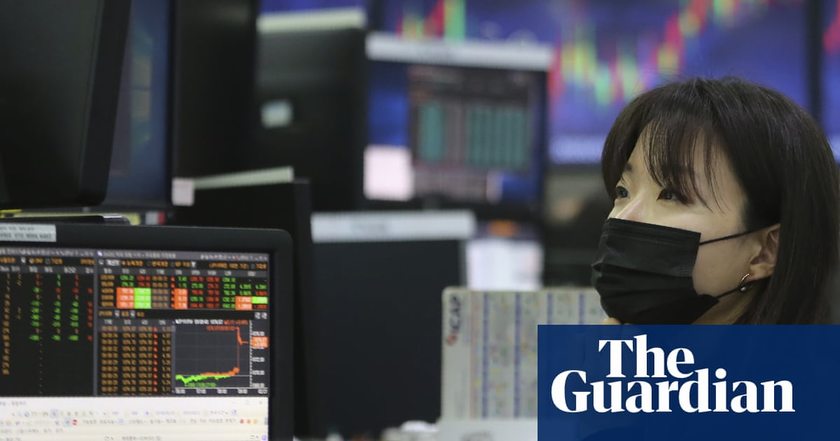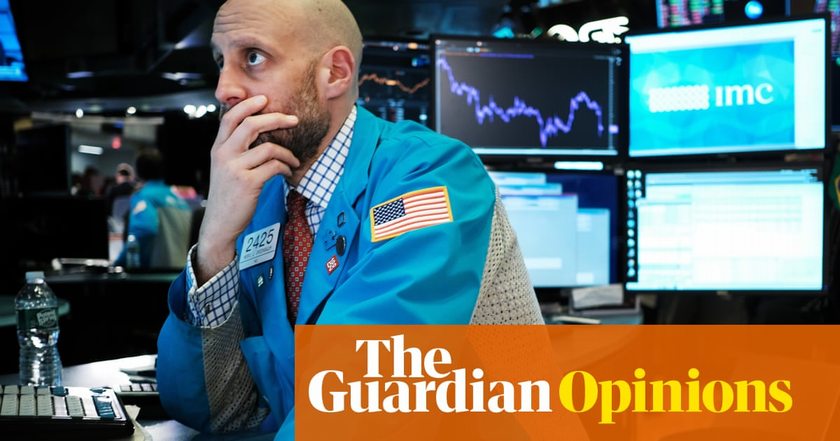The fast unfold of the coronavirus has triggered the largest plunge in international inventory markets for the reason that monetary disaster, amid rising fears over the impression on the world financial system of the lethal illness and the efforts to comprise it.
An rising variety of nations and firms are imposing powerful measures to restrict the unfold of the Covid-19 illness, with mounting prices for firm income and progress.
The outbreak has led to the quickest reversal for the inventory market since 1933 through the Nice Despair. Wall Road has slumped from record-breaking highs to the bottom level since 2016, with greater than $5tn (£3.9tn) wiped off the worth of world markets over the previous week alone.
The financial penalties have gotten more and more evident in a fast-moving disaster.
Markets
International inventory markets have had their worst week for the reason that depths of the 2008 monetary disaster, reflecting the rising concern over the financial disaster because it quickly unfolds.
Wall Road suffered its worst one-day fall ever – with the Dow Jones Industrial Common plummeting 1,190 factors on Thursday.
The FTSE 100 misplaced 823 factors over the week – equal to £206bn wiped off the worth of the highest 100 corporations – to complete at 6,580.61. Shares in airline corporations together with easyJet and the British Airways proprietor, IAG, have been among the many hardest hit. The cruise agency Carnival – the operator of the Diamond Princess ship, quarantined for coronavirus instances with one Briton amongst these killed by the illness on board – has misplaced a fifth of its inventory market worth.
International buyers rushed to purchase belongings thought of secure havens in instances of stress – together with authorities bonds and gold – sending the yield of US Treasury bonds to the bottom degree on report.
Economics
The halting of exercise to comprise the virus, the concern issue retaining customers away from outlets, and the disruption to complicated worldwide provide chains will dramatically drag down international progress.
Though the mortality price stays comparatively low, the actions to manage the virus are actually having a big effect, as enterprise journey and conferences are cancelled and world commerce and client exercise falter.
David Owen, the chief European economist on the US financial institution Jefferies, stated: “The underside line is we actually don’t know what is going to occur, however what we do know is that the concern issue and the best way folks change their behaviour makes the distinction.”
Two weeks in the past economists have been estimating that the coronavirus outbreak would have an effect much like the Sars outbreak of 2002-03, when progress faltered in China then rebounded quickly.
Nonetheless, China now makes up nearly a fifth of world GDP, in contrast with simply 4% on the flip of the millennium, and international progress was already weak after the US-China commerce conflict.
After promising to double gross home product (GDP) and revenue per head within the decade to 2020, the Chinese language Communist celebration is now on the cusp of failure.
Hitting the goal would require GDP to develop by about 5.8%, but some economists now imagine progress on this planet’s second-largest financial system might sluggish to three% this yr.
The Italian financial system, on the centre of the European outbreak, was already shrinking on the finish of final yr, elevating the prospect of a near-certain recession within the nation at a fragile second for the Eurozone.
Transport and tourism
IAG stated on Friday it was not possible to foretell how far the coronavirus impression would possibly go. Though inventory markets initially punished airways flying to China, easyJet – purely shorthaul with an nearly fully European community – has slumped after warning that 500 Italian flights could be reduce. IAG stated flights to all elements of Italy had been dramatically affected and reported a excessive price of booked passengers selecting to not journey.
Hong Kong-based Cathay Pacific stays the toughest hit outdoors the Chinese language mainland, and has reduce a 3rd of its capability. Main US and European carriers have axed direct flights to China, and falling demand has additionally hit locations in neighbouring nations.
Extra broadly, there’s a large discount in enterprise journey. The US-based International Enterprise Journey Affiliation stated coronavirus might wipe out 37% of complete international spending on work journeys, equal to $46.6bn a month. A survey of greater than 400 of its member corporations discovered 65% had cancelled conferences or occasions. Whereas nearly all had suspended enterprise journeys to China, 23% reported suspending some journeys to European nations.
Reserving Holdings, one of many predominant on-line journey brokers which owns quite a lot of manufacturers, stated room bookings have dropped as much as 10% yr on yr on this quarter, and charges have declined.
Chinese language outbound journey can also be a serious concern for tourism companies. Based on an ING evaluation, the dearth of Chinese language vacationers might price Asia $112bn in revenues this yr, with a serious impact in locations reminiscent of Japan, Thailand and Bali. The Chinese language are additionally huge spenders at their locations and in airports. The proprietor of Paris’s airports, ADP, stated a 2% drop in Chinese language passengers had brought on a 15% drop in retail gross sales. Gwyn Topham
Retail and luxurious
Manufacturers starting from Prada to Primark are struggling as client spending collapses and factories are disrupted.
Analysts have warned €40bn (£34bn) might be wiped off luxurious items gross sales as home and abroad journey restrictions put the brakes on the spending of rich Chinese language. They’ve pointed to corporations reminiscent of Swatch, which owns Omega watches, Richemont (the corporate behind Cartier, Panerai and Internet-a-Porter) and Prada as being within the entrance line of the downturn.
The outbreak can also be disrupting the availability chains of mainstream retailers which supply mountains of clothes, electricals and toys in China. Primark, which buys 40% of its clothes there, has warned there might be shortages this yr if delays proceed.
The toy commerce, which imports 70-80% of its merchandise from China, is especially weak. Gary Grant, the chief chairman of the toy retailer The Entertainer, warned that if issues weren’t again to regular by Might there might be shortages come Christmas. “Hardly something is leaving China,” he defined, including factories that needed to renew work have been hampered by their very own fractured provide chains.
The Retail Economics chief government, Richard Lim, stated some retailers have been going through huge issues. He stated: “One retailer I spoke to relied on one element being produced in China that they haven’t been capable of get for 5 to 6 weeks. They’ll run out of their predominant product which accounts for 70% of their gross sales inside weeks. This can be a well-known UK retailer that has over 600 shops.”
The drinks firm Diageo has suffered a £200m hit to income because of the closure of bars and eating places in China. Anheuser-Busch InBev, which owns manufacturers together with Budweiser, additionally reported a $170m revenue hit in China resulting from “nearly no” nightlife. Zoe Wooden
Finance
Chinese language banks, and lenders with giant Asian operations, shall be uncovered to a spike in dangerous money owed if affected prospects begin to default on their loans.
S&P International Scores has warned that China’s 30 largest lenders, together with Industrial and Industrial Financial institution of China and China Development Financial institution, might face dangerous money owed of £847bn if the virus shouldn’t be contained by April.
Enterprise prospects are anticipated to wrestle to maintain up with funds if the outbreak hits their gross sales. Banks reminiscent of Commonplace Chartered are permitting debtors to make interest-only funds on their money owed. The financial institution has already warned it would miss its monetary targets this yr on account of the virus.
HSBC, which counts Hong Kong as its largest market, might be pressured to put aside as a lot as $600m to cope with the potential fallout. Kalyeena Makortoff
Manufacturing and carmakers
The cancellation of the Geneva Worldwide Motor Present, the largest automobile present scheduled in Europe this yr, is only one image of the turmoil hitting the automotive sector.
The centre of the worldwide outbreak was Wuhan, considered one of China’s key automobile manufacturing centres with 12 separate crops. Quarantine situations have meant weeks of misplaced output.
The results of squeezed provide chains haven’t but been felt at most main UK crops, reminiscent of Nissan’s Sunderland manufacturing unit or Peugeot’s Vauxhall websites. Nonetheless, the digger maker JCB has needed to reduce manufacturing at its Staffordshire factories and Jaguar Land Rover has warned it has little greater than per week left earlier than it faces a scarcity of key parts.
Chinese language automobile gross sales plummeted by 92% within the first half of February in line with the China Passenger Automobile Affiliation. Analysts concern that the freeze on gross sales will unfold to Europe as folks postpone main purchases. Jasper Jolly
Leisure
China had been forecast to overhaul the US because the world’s largest film market this yr. The coronavirus outbreak has put paid to that with the 70,000 screens in 11,000 complexes throughout China shut since 24 January. The price to the worldwide field workplace is heading in the direction of $2bn, with China the largest abroad marketplace for Hollywood movies.
Past movie, Disney’s theme parks in Shanghai and Hong Kong stay shut, and two parks in Tokyo have simply been closed till mid-March. Mark Sweney
Tech and telecoms
Microsoft warned this week that its private pc enterprise could be hit by manufacturing shutdowns in China. Apple was the primary huge tech firm to warn of the monetary impression of the virus, warning of potential “iPhone provide shortages”, because it additionally depends on China for a lot of its manufacturing. Mark Sweney
Oil and pure sources
Coal consumption at Chinese language energy stations has collapsed in latest weeks, whereas supertankers able to holding greater than 2m barrels of crude oil every have been left stranded outdoors China’s predominant import terminal of Qingdao after the shutdown of refineries.
The Worldwide Power Company estimates that refinery slowdowns could have shaved greater than 1m barrels a day from international oil demand.
Oil costs have tumbled by greater than 10% within the final week to beneath $50 a barrel for the primary time in additional than a yr. Oil producers had anticipated the benchmark Brent crude worth to common nearly $60 a barrel this yr. Jillian Ambrose








